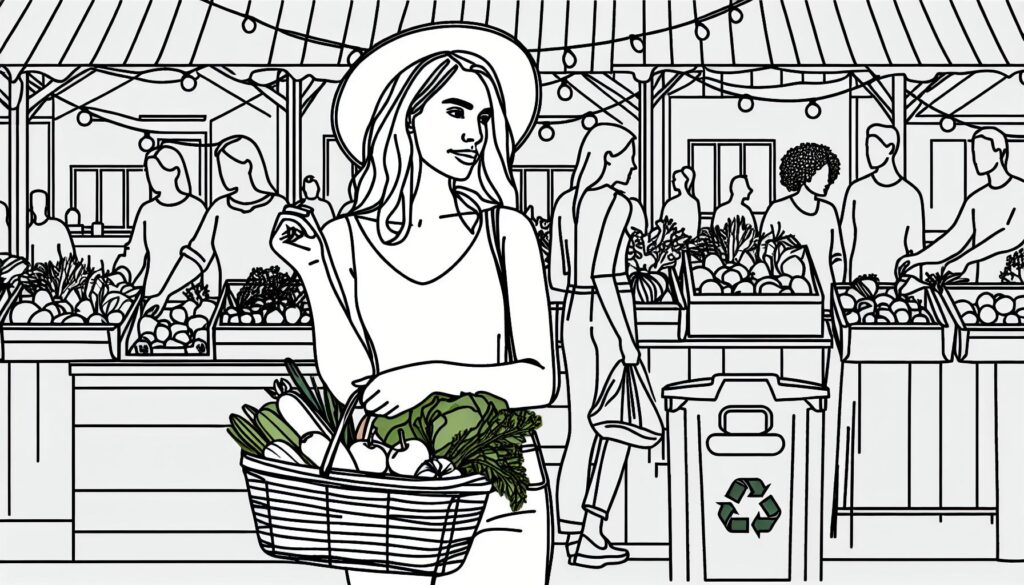In our fast-paced world, it’s easy to overlook the power of sustainability and its impact on our wellbeing. Yet, the connection is undeniable. As I delve into this topic, you’ll discover how adopting sustainable practices can lead to a healthier, more fulfilling life.
Sustainability isn’t just about the environment. It’s about creating a balance that benefits us all. It’s about understanding that our actions today shape our future tomorrow. This includes the food we eat, the products we buy, and even the way we live.
So, let’s embark on this journey together. Let’s explore the power of sustainability and its profound impact on our wellbeing. You might be surprised by what you learn and how it can transform your life.
Key Takeaways
- Sustainability is a multi-faceted concept inextricably linked to our well-being, encompassing environmental aspects, social equity, and economic stability.
- The benefits of green spaces in urban areas are notable, providing physical and emotional benefits for their inhabitants, as indicated by the Journal of Public Health.
- Sustainable practices such as supporting local, organic produce and practicing conscious consumerism can significantly enhance personal wellbeing and positively impact the environment.
- Sustainable food choices directly influence health outcomes, reducing exposure to harmful substances like pesticides and antibiotic-resistant bacteria while promoting nutrient-rich food intake.
- Mindful eating and a focus on sustainable food choices can lead to healthier populations, support local economies, reduce carbon emissions, and offer a gateway to diverse food experiences.
- The future wellbeing of individuals and communities inextricably links to the adoption of sustainable practices across various aspects of life. A sustainable lifestyle contributes to enhanced nutrition, reduced pollution, fair trade practices, waste reduction, and water conservation.
Understanding the Importance of Sustainability
People often brush sustainability off as a buzzword or a fleeting trend. However, it’s much more than that – it’s a mindset and a way of life that can shape our future.
Firstly, let’s dive into what sustainability truly means. In essence, sustainability is about meeting our current needs without compromising the ability of future generations to meet their own needs. It’s rooted in three key principles: economic sustainability, social sustainability, and environmental sustainability. These form the pillars on which a balanced, sustainable world should stand.
You might wonder, “How does sustainability impact well-being?” Studies have shown that there’s a strong correlation between the two. I remember a report published in the Journal of Public Health, which indicated that green spaces in urban areas have a significant impact on physical and emotional well-being.
Take a look at the table below, which shows data from the report:
| Green Spaces | Physical Well-being | Emotional Well-being |
|---|---|---|
| Low | 35% | 30% |
| Medium | 45% | 40% |
| High | 60% | 55% |
As evident from this table, people living in areas with a high level of green spaces report better overall well-being. It’s not just about the environment, though. Social sustainability, too, plays a major role in our health and happiness. Community engagement, social equity, and cultural competence are all pieces of this puzzle.
Economic sustainability is the third pillar. Contrary to popular belief, it doesn’t just refer to steady employment and robust markets. It touches our personal financial wellbeing, ensuring we can provide for our needs now and down the line.
Recognizing the intertwined nature of these three pillars is paramount to understanding the importance of sustainability. They form a three-legged stool that gives us stability and fosters an environment conducive to personal and societal well-being.
Sustainable Practices for Improved Wellbeing
Adopting sustainable practices into our daily routines can significantly enhance our well-being. By choosing to live mindfully, we’ll notice improvements not only in our physical and mental health, but also in the communities we sustain.
Consider your food choices. Consuming locally grown, organic produce not only supports your local farmers and economy, but it’s also healthier and tastier. These choices reduce fuel emissions due to shortened transportation routes, making it a win-win for everyone. On a larger scale, advocating for sustainable farming practices can lead to systemic changes in the agricultural sector, contributing to better overall community health.
Next, conscious consumerism, is a valuable practice. Be mindful of the products you purchase – opt for those that are ethically sourced and have minimal environmental impact. Understand the life cycle of the product, from its creation to disposal. It’s not just about feeling good because you bought a ‘green’ product. It’s about knowing that your choice is contributing to a sustainable future, one product at a time.
Utilizing green spaces for exercise and leisure activities has immense benefits too. They serve as havens for stress relief and provide opportunities for physical activity, in addition to being key components of sustainable cities.
Incorporating these sustainable practices into your lifestyle won’t magically make all the world’s problems disappear. However, these small changes accumulate and create significant impacts on our personal wellbeing, our communities, and the planet.
| Sustainable Practices | Benefits |
|---|---|
| Local, Organic Food | Healthier food, Reduced emissions, Supports local economy |
| Conscious Consumerism | Protects environment, Encourages ethical sourcing |
| Green spaces | Promotes physical activity, Provides stress relief |
Impact of Sustainable Food Choices on Wellbeing
The power of sustainability reaches far and wide; it’s not just about preserving the environment, but also about safeguarding our own wellbeing. Sustainable food choices, a crucial part of a sustainable lifestyle, have a direct impact on our health and wellness.
When I choose to eat locally grown, organic farm produce, I’m not only boosting the local economy, I’m also subscribing to a healthier diet. Organic produce is grown without synthetic pesticides, lowering my exposure to these potentially harmful substances. In fact, a study published in the Journal of Nutritional Biochemistry confirms that organic food consumption reduces exposure to pesticide residues and antibiotic-resistant bacteria. Let’s take a look at the key figures obtained from the study:
| Organic Food Consumers | Non-Organic Food Consumers | |
|---|---|---|
| Pesticide Exposure | Lower | Higher |
| Antibiotic-Resistant Bacteria Exposure | Lower | Higher |
On the other hand, factory-farmed meat and processed food often contain high levels of fat, sodium, and sugar, contributing to health issues like obesity, heart disease, and diabetes.
Moreover, sustainable food choices tend to be fresher and more nutrient-rich. By trading processed snacks for fresh, locally sourced fruits and vegetables, I’m filling my plate with a rainbow of nutrients. It’s worth noting that a healthy diet full of diverse, natural foods can boost the immune system, help maintain a healthy weight, and reduce the risk of chronic diseases.
Every time I make a sustainable food choice, I’m taking a small but important step towards not only a healthier body but also a healthier planet. Eating sustainably doesn’t push us to compromise on flavor or variety. If anything, it widens our horizons and introduces us to new flavors, encouraging us to be adventurous in our culinary experiences. Besides, it’s a gratifying feeling knowing that even our plate can be a place for positive change.
Creating a Sustainable Lifestyle for Better Health
Do we ever think about how our food choices can be a powerful tool for creating a sustainable lifestyle that ultimately leads to better health? The answer’s simple – most of us don’t. However, studies show that making sustainable food choices can positively affect our personal health and the health of our planet.
One way we can adopt a more sustainable lifestyle is by supporting local farming. By purchasing locally grown food, we reduce carbon emissions associated with food transportation, contribute to the local economy, and ensure that we’re consuming fresh, nutrient-rich food.
Let’s consider the typical diet most of us follow. Factory-farmed meat and processed foods are often high in fat, sodium, and sugar. Consistent intake of these foods may lead to health conditions such as obesity and heart disease. Compare this to a diet rich in organic, locally sourced fruits, vegetables, and lean meats. These foods not only taste better but are packed full of the essential nutrients our bodies need – without the added artificial flavors, colors, or preservatives found in processed foods.
The key is mindful eating. Paying closer attention to the quality and source of the ingredients we use in our meals can make a big difference to our health and the environment. It’s not just about going organic, it’s about making a conscious effort to understand where our food comes from and how it’s produced.
Take for instance, our everyday grocery shopping. Opting for plastic-free or minimal packaging options, buying in bulk, and choosing items with labels such as ‘fair trade’, ‘locally grown’, or ‘organically farmed’ can be an easy and effective step towards leading a more sustainable lifestyle.
In the big picture, these sustainable food choices not only lead to a healthier body and planet but they also open doors to a diverse array of flavors and cuisines – taking our culinary experiences to a whole new level. Not to mention, they contribute significantly in reducing our exposure to harmful substances like synthetic pesticides.
So, next time you’re planning a meal or shopping for groceries, remember: every choice we make matters when it comes to supporting a sustainable lifestyle for better health. We can make a difference – one meal at a time.
The Future of Wellbeing: Embracing Sustainability
As I gaze into the near horizon of holistic living, I find that it’s becoming increasingly clear that sustainable choices will shape our path to future wellness. Embracing sustainability isn’t just about saving the environment; it’s also about ensuring our wellbeing and that of future generations.
Let’s dissect this a touch more. One of the primary facets to consider within this discussion is the quality of nutrition. Opting for local and organic foods promises fresher meals, richer in nutrients, and free from harmful synthetic pesticides. This means we’re not only eating better but also enjoying improved health and vitality.
Another aspect to mull over revolves around reducing our carbon footprint, which can directly impact our health. Lower emissions mean cleaner air and less exposure to health-hazardous pollutants. As a result, we can see fewer cases of respiratory issues and thereby, healthier communities.
Here’s a glance at what we’ve talked about:
| Sustainability Aspects | Impact on Wellbeing |
|---|---|
| Local and Organic Foods | Richer nutrition, reduced exposure to pesticides |
| Reduced Carbon Footprint | Cleaner air, lesser respiratory issues |
But embracing sustainability doesn’t end at our diet or reduction in emissions. It further extends to reducing waste, conserving water, and supporting ethical trade practices. For instance, by choosing products with minimal or biodegradable packaging, we are not only reducing waste but also limiting our exposure to harmful chemicals often found in plastic materials.
Similarly, by advocating for fair trade practices, we ensure that farmers and producers get fair compensation for their work. This not only improves their quality of life but also encourages sustainable farming practices, leading to more organic, pesticide-free choices for us – a win-win situation for both parties.
The future of wellbeing is closely tied to our willingness to embrace sustainability. Our journey towards better health isn’t just about what’s on our plate or the cleanliness of our air, but also about the broader impact of our choices on the community and the environment. So, let’s continue this exploration, and see what more we can unveil about how sustainability and wellbeing walk hand in hand.
Conclusion
So, it’s clear that sustainability isn’t just a buzzword but a powerful tool for our wellbeing. By making conscious choices, like favoring local and organic foods, we’re not only nourishing our bodies but also protecting our planet. Reducing carbon footprints isn’t just about cleaner air; it’s about fostering healthier communities. Every step towards waste reduction, water conservation, and fair trade practices is a stride towards a sustainable future. It’s not just about us; it’s about creating a better world for generations to come. Sustainability is more than a concept; it’s a lifestyle that positively impacts our health, our communities, and our world. Embrace it, live it, and reap the benefits.



